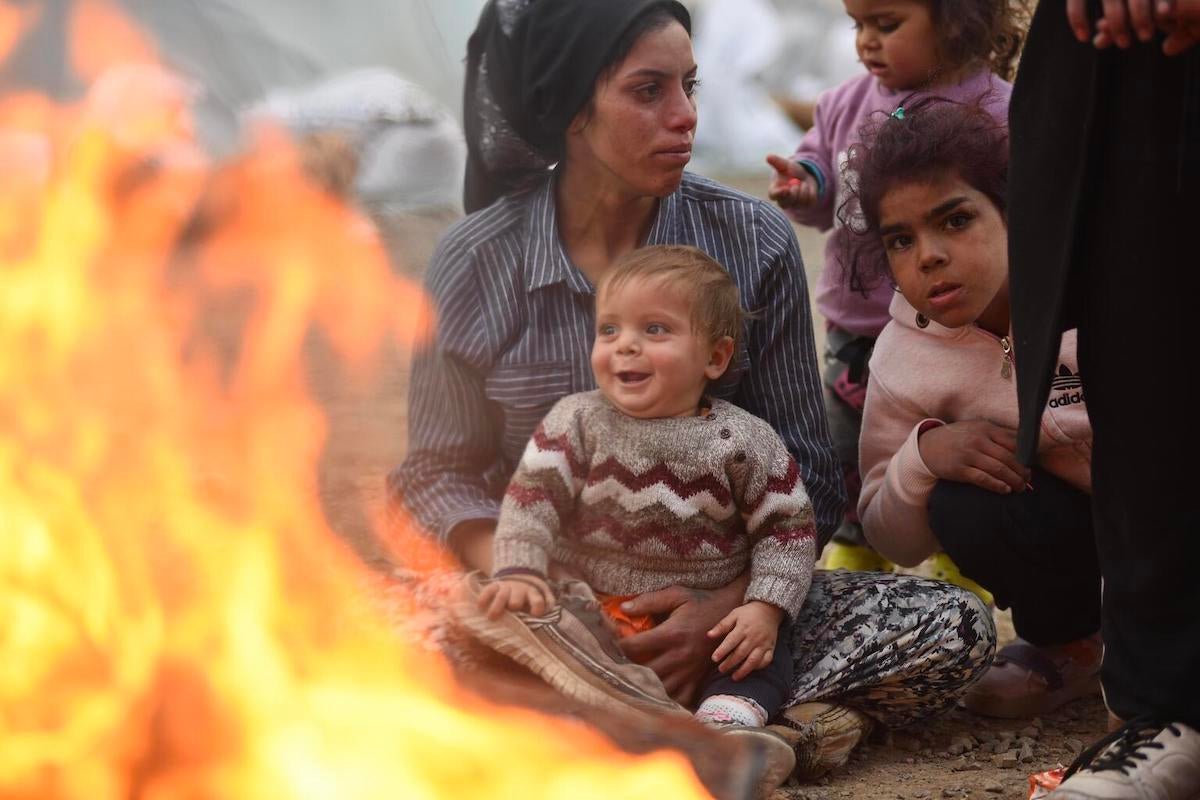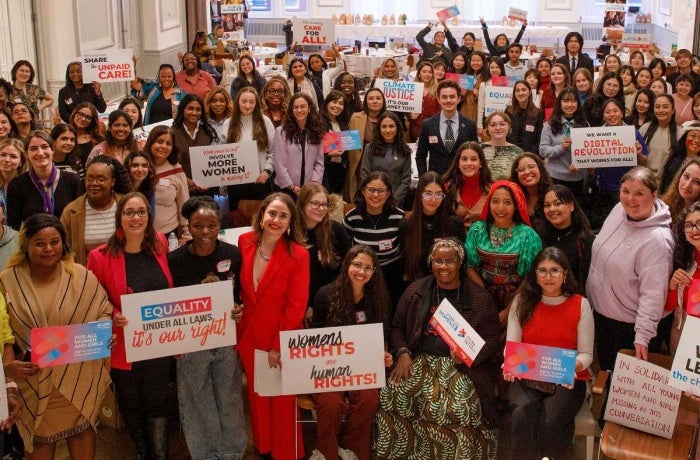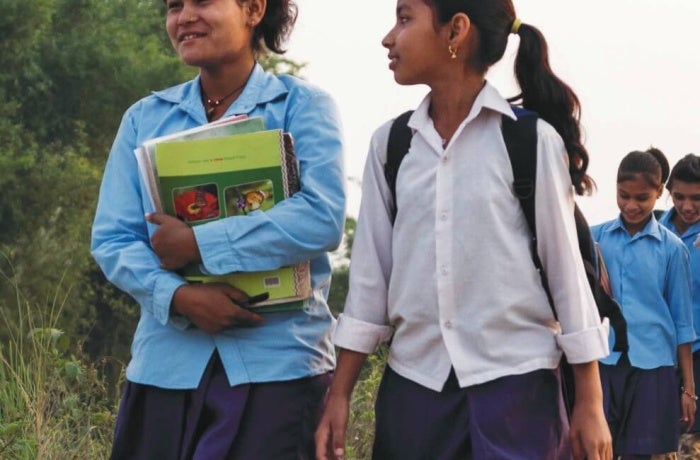Op-ed: Always on the frontline in every crisis
When crises strike, women and girls consistently suffer disproportionately. We need urgent, systemic change to ensure that gender equality is at the center of crisis response.
COVID-19, climate, conflict, cost of living. Over recent years, the world has been rocked by repeated shocks and multiple, overlapping crises. Violent conflict is a deadly reality for billions of people, while climate disasters are increasing in frequency and severity. With progress on poverty eradication and gender equality in reverse, achieving the Sustainable Development Goals (SDGs) is under threat. In this world of soaring risks and vulnerabilities, bold, concerted action is needed to catalyze the changes that are needed to get back on track.

Crises are gendered. Because women and girls start off at a disadvantage in every society, they often have fewer resources to be able to withstand the impacts of crises and shocks. The COVID-19 pandemic acted as a “big revealer” in this regard. School and care service closures meant that women did an estimated 512 billion additional hours of unpaid childcare globally, adding to already large and unfair burdens. Partly as a result, the fragile progress that women had made in employment was wiped out, with their labor force participation projected to remain below pre-pandemic levels in most countries. Cases of violence against women, already a blight on one in three women’s lives prior to the pandemic, increased as lockdowns trapped women with potential abusers, and services shut.
Despite rhetoric on “building back better,” there has been no respite for women and girls. The conflict in Ukraine has exacerbated food and fuel shortages and precipitated a cost-of-living crisis. High rates of inflation have hit the poorest households hardest, those in which women and girls are overrepresented. Combined with changing weather patterns and crop failures, this has left almost a third of the world’s women in moderate or severe food insecurity.
At the same time, women have been at the forefront of responding to complex crises and emergencies:
- as the majority of health workers stemming pandemic outbreaks
- as peacebuilders in conflict zones working tirelessly to broker peace and rebuild their societies
- as leaders of community-based organizations coordinating food aid, health, and hygiene kits in the aftermath of natural disasters, when other support is slow to arrive
The impacts of these contributions are profound. Research shows that strong women’s organizations and women’s participation contributes to stronger democracies and to longer-lasting peace after conflict. Yet, women are sidelined from decision-making processes and their organizations are starved of cash. In a world where protracted crises and repeated shocks are the new normal, we cannot afford to sideline the rights and needs of half of the world’s population in our response. Three systemic changes can help to ensure that gender equality is at the center of crisis response and efforts to achieve the SDGs.
First, governments need to invest in gender-responsive social protection systems that can protect women from the impacts of ever more frequent shocks and crises. Cash transfers for families with young children, maternity leave, and social pensions are essential for alleviating women’s poverty throughout their lives. These measures are especially critical for the 740 million women globally who are employed in poor quality, informal work, and can lose their jobs from one day to the next. Social protection has become even more essential in a world in which food prices can suddenly become unaffordable or a climate disaster can destroy a family’s livelihood overnight. It can also play a role in preventing gender-based violence and enable survivors to rebuild their lives.
Social protection measures were a key part of governments’ unprecedented policy response to the COVID-19 pandemic. But our research found that of the more than 3,000 social protection and labor market measures adopted by 226 countries and territories, only 20% aimed to strengthen women’s economic security or provide support for rising unpaid care demands. While inadequate overall, some countries took important and innovative steps in the right direction. For example, Brazil, Chile, South Africa, and Togo experimented with cash transfers for informal workers and strengthened access to unemployment insurance for domestic workers. The question now is whether those and other pandemic-related measures can be sustained and built upon to ensure women’s economic security now and in the future.
Some countries were able to respond more effectively than others during the pandemic, which points to the second key area of change required to get the SDGs back on track: adequate financing. Governments in the Global South need to be able to mobilize significant resources to fund public services and social protection in times of peace and stability, but especially in times of crisis. This is a feminist issue because when economic crises hit and public spending is stretched thin, it is women who lose their jobs first, who eat least and last, and who act as “shock absorbers,” picking up additional unpaid care work to sustain their families and communities.
During the pandemic, the International Monetary Fund issued special drawing rights (SDRs) to provide countries with immediate liquidity to respond to the needs of their people. Unfortunately, most of these resources went to high-income countries which did not need or use them.
Today, the global economy remains in a very fragile state, and rising interest rates have rapidly increased the cost of borrowing. But more than 50 developing countries, in which more than half of the world’s poorest people live, are dangerously close to defaulting on their debts, which could lead to yet another global debt crisis. Led by Mia Mottley, the Government of Barbados has been leading calls for reform of the global financial system and, by expanding the use of SDRs, proposing innovative, new approaches to ensuring that those countries hit hardest by climate disasters and changing weather patterns can access the finance they need. The UN Secretary-General has recently added his voice to the call for reform of the global financial system.
Finally, we need to change not only what we do but also how we do it. UN Women has been calling for a new feminist politics, which is about amplifying the voices of visionary women leaders like Mia Mottley but also recognizing that we need to see progressive feminist voices at every level of decision-making, from local communities up to global governance. During the pandemic, there was an extraordinary upsurge in feminist activism, in spite of lockdowns and restrictions on public gathering. Adding to a growing body of evidence about the benefits (for everyone) of women’s inclusion, we found that where women were better represented and where women’s movements were strong, governments introduced more measures to support unpaid care work and protection from violence. Yet, women’s representation, whether in local governance, national politics, or in climate negotiations and peace talks, has largely stalled, depriving these processes of the diverse voices needed to ensure innovative solutions to the challenges we face.
Ensuring inclusive and effective responses to crises in the future requires a concerted push towards gender parity in political office and public administration, alongside the protection and strengthening of women’s rights organizations, and democratic institutions that enable women’s diverse voices to be heard and heeded.
Women should not be the world’s last line of defense. These three systemic changes would ensure much-needed support, resources, and political will to ensure that gender equality and women’s rights are at the center of efforts to achieve the SDGs.









